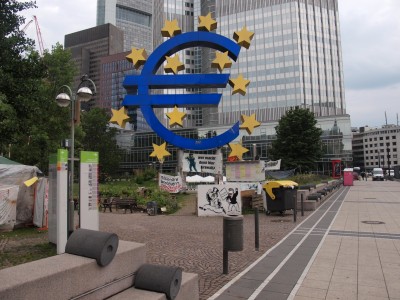The economy is stagnating. Once again.
Whistleblowers from among analysts and economists reported total collapse of economy ever since 2007, with a periodicity of a radio traffic service.
Many did not realize though, that the “disaster” may still be the better case. Some bankruptcies, some lost savings, people will cry a bit and we can move on. However, we are moving closer to the second alternative – long-term economic stagnation.
But after a brief enthusiasm from tenth-ish growths in 2013, complete sobering comes now. The growth in the euro area got to the freezing point. The third biggest economy in a club – Italy – entered its third recession since 2008. Maybe we should write that it actually got stuck in one big recession, with couple of short exhalations. The second largest one – France – is reporting leaving its deficit goal for 2014. Although it was already clear to all of us, the government now officially admits that 3% budget deficit of the state’s budget will not happen this year either. Neither the famous fiscal compact helped to European politicians to adhere to agreed rules. Eurozone debt grows nicely and in the first quarter reached 93.9% of GDP. In June we even noted the new member in the “trillion club”, when Spanish debt exceeded one trillion euros (98.4% of Spanish GDP).
Whatever happened to Italians or French, Germans were always there to save the day. But even they are running out of breath now. In the second quarter of 2014, Germany registered a 0.2% decline of GDP and is with one foot in recession.
And watch out, we are talking here about the second quarter of 2014, so the sanctions which the EU and Russia imposed on each other are not recorded yet. Economic loss for the citizens of the EU and of Russia are inevitable – thanks to decisions of their politicians. Europe will not dig out that easily from the current situation.
Clueless looks of politicians will be once again drawn to the ECB. In addition to reports on starting recession, they are supported also by the legend of deflationary spiral that regularly emerges from monetary depths to destroy the shoots of economic success.
The ECB, unlike the American Fed and British BoE, did not use the “classical” quantitative easing but poured money into the economy through loans to banks instead, mainly through the program of short-term ones – LTRO. Its differentiating feature is more or less automatic exit. Loans have due dates and so money is withdrawn from economy again. From the original more than a trillion euros of three-year loans remain about a third, exactly 368.9 billion euros unpaid.
These resources did two things to economy. First, they kept running illiquid banks which could not borrow on the interbank market. Second, they contributed to a massive decline of interest rates on government bonds, since available funds of the bank were partially used to buy government bonds. But reduced interest rates have to be attributed to other programs – ones focusing on the purchase of government bonds (SMP and especially OMT).
National budgets and banks were given infusion but the firms were set aside. Interest rates were growing on corporate loans. And if we add the consolidation – largely on the revenue side of public finances across the Europe, increasing regulatory burdens (such as green policy) and slow opening of the markets to the world, it is no wonder. And now – the icing on the cake – sanctions…
The ECB has prepared the program of loans T-LTRO, aiming at companies which should be quietly compensated by one trillion euros for the old LTRO, which is slowly returning from it. The ECB hopes that this time, it will not be just about moving billions up and down the accounts of ECB (the previous ones were sitting there as a reserve) and something will actually make it to the real economy.
The program, however, is already seen as a decrepit continuation of the old LTRO. Major change would be to launch the quantitative easing – direct purchasing of assets by the central bank. But current exports say that chances of its launch in 2015 are one in three. ECB’s reluctance though, might quickly break with the worsening economic situation.
A discussion about short and long-term effects of quantitative easing, or “money printing” belongs to the traditional battles of economic schools. Therefore we are putting this issue aside and will finish lightly, despite the decline in GDP.
What could please us more than sly businessman who outwit the politician? French government has banned free delivery of books to Amazon, couple of weeks ago. Don’t ask why, we are talking about France. Anyway, Amazon did not take long time to come up with an idea how to circumvent this prohibition. They began to charge the delivery with 1 cent.
And if you like interesting reading, have a look into publications from Brussels. Officials are dealing with lots of attractive and important activities. For instant, conducting an extensive survey of public opinion on the “robot”. As they found out, 70% of EU citizens believe that robots are taking the jobs. Hopefully, the Commission will soon take action and cars will again be assembled with a hammer and screwdriver!
Have a nice rest of the week,
Martin Vlachynský
14.8.2014
Translation: Stanislava Dovhunová



















No comments
Be the first one to leave a comment.